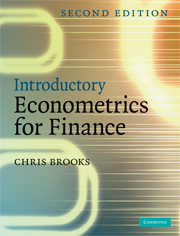Book contents
- Frontmatter
- Contents
- List of figures
- List of tables
- List of boxes
- List of screenshots
- Preface to the second edition
- Acknowledgements
- 1 Introduction
- 2 A brief overview of the classical linear regression model
- 3 Further development and analysis of the classical linear regression model
- 4 Classical linear regression model assumptions and diagnostic tests
- 5 Univariate time series modelling and forecasting
- 6 Multivariate models
- 7 Modelling long-run relationships in finance
- 8 Modelling volatility and correlation
- 9 Switching models
- 10 Panel data
- 11 Limited dependent variable models
- 12 Simulation methods
- 13 Conducting empirical research or doing a project or dissertation in finance
- 14 Recent and future developments in the modelling of financial time series
- Appendix 1 A review of some fundamental mathematical and statistical concepts
- Appendix 2 Tables of statistical distributions
- Appendix 3 Sources of data used in this book
- References
- Index
13 - Conducting empirical research or doing a project or dissertation in finance
- Frontmatter
- Contents
- List of figures
- List of tables
- List of boxes
- List of screenshots
- Preface to the second edition
- Acknowledgements
- 1 Introduction
- 2 A brief overview of the classical linear regression model
- 3 Further development and analysis of the classical linear regression model
- 4 Classical linear regression model assumptions and diagnostic tests
- 5 Univariate time series modelling and forecasting
- 6 Multivariate models
- 7 Modelling long-run relationships in finance
- 8 Modelling volatility and correlation
- 9 Switching models
- 10 Panel data
- 11 Limited dependent variable models
- 12 Simulation methods
- 13 Conducting empirical research or doing a project or dissertation in finance
- 14 Recent and future developments in the modelling of financial time series
- Appendix 1 A review of some fundamental mathematical and statistical concepts
- Appendix 2 Tables of statistical distributions
- Appendix 3 Sources of data used in this book
- References
- Index
Summary
Learning Outcomes
In this chapter, you will learn how to
Choose a suitable topic for an empirical research project in finance
Draft a research proposal
Find appropriate sources of literature and data
Determine a sensible structure for the dissertation
What is an empirical research project and what is it for?
Many courses, at both the undergraduate and postgraduate levels, require or allow the student to conduct a project. This may vary from being effectively an extended essay to a full-scale dissertation or thesis of 10,000 words or more.
Students often approach this part of their degree with much trepidation, although in fact doing a project gives students a unique opportunity to select a topic of interest and to specify the whole project themselves from start to finish. The purpose of a project is usually to determine whether students can define and execute a piece of fairly original research within given time, resource and report-length constraints. In terms of econometrics, conducting empirical research is one of the best ways to get to grips with the theoretical material, and to find out what practical difficulties econometricians encounter when conducting research. Conducting the research gives the investigator the opportunity to solve a puzzle and potentially to uncover something that nobody else has; it can be a highly rewarding experience.
- Type
- Chapter
- Information
- Introductory Econometrics for Finance , pp. 585 - 597Publisher: Cambridge University PressPrint publication year: 2008



